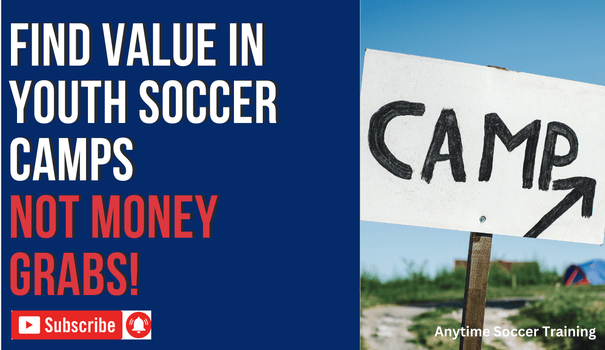
In the world of youth soccer, the mention of “soccer camps” often elicits mixed reactions from parents. As a soccer dad, I’ve seen firsthand how my children have experienced both fantastic soccer camps that greatly contributed to their development and disappointing ones that seemed more focused on profit than player progress.
This article aims to shed light on what makes a soccer camp truly beneficial, offering insights for parents navigating the landscape of youth sports.
This article was contributed by Mega Soccer Hub, a platform simplifying the discovery and promotion of youth soccer opportunities. Click below to explore our free and paid membership options.
Addressing the Cost Factor:
Let’s start by addressing the elephant in the room: yes, soccer camps do come with a price tag. After all, coaches need to be compensated, facilities need to be rented, and equipment needs to be provided. But does this automatically mean that the camp is a money grab? NO!
Money Grab vs Real Development:
Check out who’s coaching—are they seasoned pros or just college kids on break? See what other parents say about the camp. Do the kids actually have fun? And don’t forget to ask about rainy day plans! Look for camps with a clear focus to boost your child’s skills and keep them engaged.
Related: Best European Soccer Tournaments
Opportunity for More Touches:
It’s no secret that consistent practice and repetition are key to improvement in any sport, and soccer is no exception. Every touch on the ball – whether it’s a pass, a dribble, or a shot – strengthens a player’s technique, enhances their confidence, and hones their instincts on the field.
And where better to accumulate these touches than at a soccer camp, where structured training sessions and skill-building exercises abound?
Tips for Choosing the Right Camp:
The key lies in doing your research and asking the right questions. Instead of dismissing a camp outright based on hearsay or preconceived notions, take the time to gather information from trusted sources who know your child’s needs and abilities.
Talk to coaches and other parents who have firsthand experience with the camp in question. What did they like about it? What didn’t they like? Did their child benefit from the training sessions and experiences offered?
Recognizing Quality Camps:
Many reputable soccer camps provide high-quality coaching from experienced professionals, tailored training sessions designed to improve technical skills and tactical understanding, and exposure to new playing styles and strategies.
These experiences can be hugely beneficial for young athletes looking to take their game to the next level.
Avoiding Unrealistic Promises:
That being said, not all soccer camps are created equal. Some may promise unrealistic outcomes, such as the chance to be scouted by professional teams or earn a spot on a prestigious academy.
It’s important to approach these claims with a healthy dose of skepticism and to carefully evaluate the true value proposition of the camp.
Conclusion:
So, the next time you find yourself considering a soccer camp – whether it’s renowned for its prestige or notorious for its profit-driven motives – remember this: every touch on the ball is a step forward in your child’s development as a soccer player.
And in a sport where improvement is measured in small increments, every training opportunity is a chance for growth, learning, and enjoyment. After all, isn’t that what youth soccer is all about?














